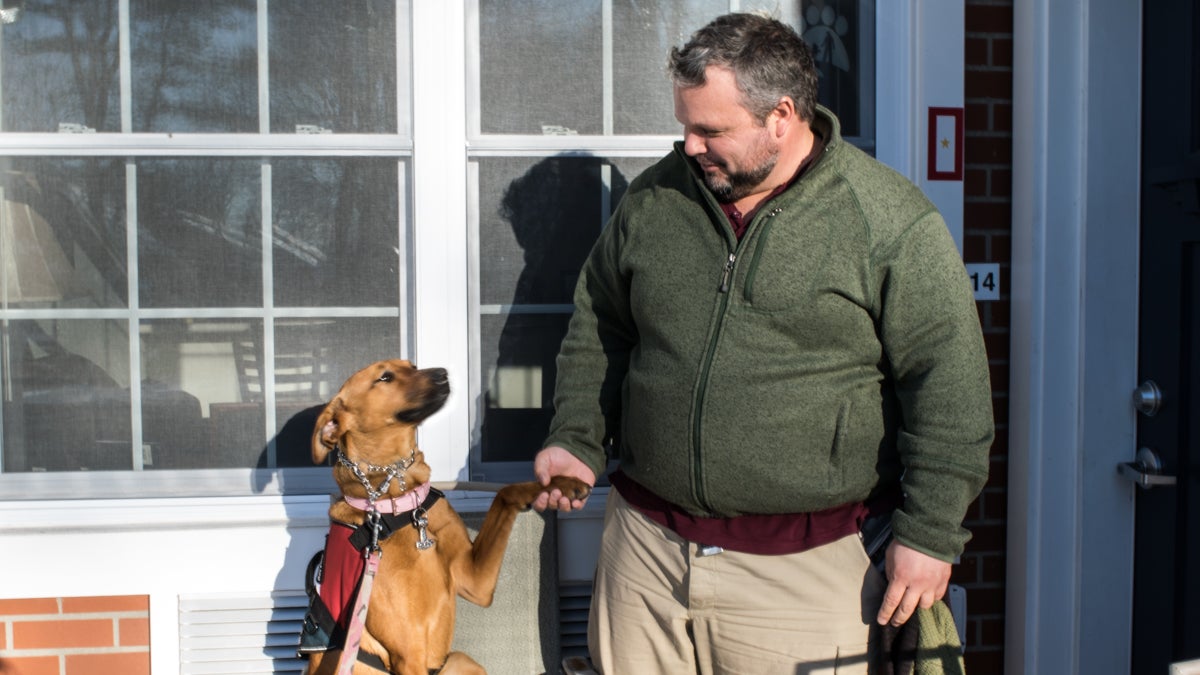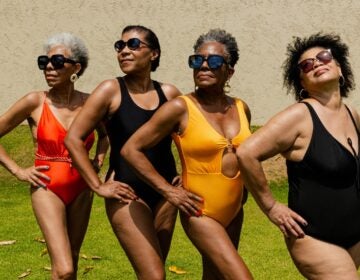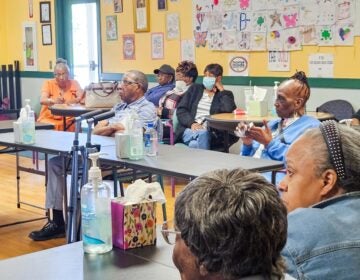Veteran with PTSD gets a helping paw from a shelter dog
Listen
Russel Keyser shaking hands with his service dog, Artemis. (Paige Pfleger/WHYY)
Many veterans come home and have trouble adjusting to civilian life, and that adjustment weighed heavily on Russel Keyser.
In 2004, Keyser served in the U.S. army in Kosovo during a time of violent unrest.
During this conflict, Kosovo Albanians attacked Kosovo Serbs. Civilians were murdered, hundreds injured, and many were forced out of their homes, which were eventually destroyed.
Keyser was part of a peacekeeping mission that, at times, was dangerous and stressful. Keyser developed post-traumatic stress disorder that continued to plague him in his civilian life when he came back to his home in Long Island.
“At the worst I would only sleep two or three hours a night if I was lucky,” Keyser said. “When I did sleep, the dreams were like I was in a state of pure terror, the nightmares and the dreams were like closing my eyes and going into a horror movie. When a door opens, I shudder and climb underneath the table. It’s embarrassing.”
Keyser tried a bunch of veterans support groups, and then he heard about Paws of War. It’s a Long Island-based group that takes dogs from shelters and trains them to be service animals for veterans across the country. Keyser says he was doubtful it would work.
“I pretty much told Paws of War, ‘This is what’s going on with me, how can a dog help?'” Keyser said.
About a year ago, he was matched with Artemis — she’s a Belgian Malinois, and kind of looks like German shepherd, but sleeker.
Artemis was just a puppy, so at first there was an adjustment period, but Keyser says eventually he noticed a difference.
“If the service dog helps me stay in public places around people, that means I can get the help I need,” Keyser said. “You can’t get the benefit of like a 12-step meeting if you can’t be in the meeting due to PTSD reasons.”
Keyser’s symptoms are fairly typical for a returning veterans, and Paws of War trained Artemis to respond to Keyser. If she senses his blood pressure is rising, she paws at his feet. For his anxiety, she nips at his hand. And when he has night terrors, she jumps up onto the bed and licks his face. If she senses Keyser is on edge, she’ll get behind him to block other people from approaching unexpectedly.
“If someone comes up behind me and startles me, I might have a reaction, and those reactions sometimes are physical,” Keyser said. “I might grab you, you know? I might hurl you off of me. It has happened.”
But Keyser says that Artemis prevents reactions like that from happening as often as they used to. It’s almost like she’s his medicine.
“I know antibiotics work too. I don’t need to go through the chemical breakdown of it,” he says with a laugh. “I can live a normal life. I could not live a normal life without her.”
Listen to Russel Keyser’s full story above.
WHYY is your source for fact-based, in-depth journalism and information. As a nonprofit organization, we rely on financial support from readers like you. Please give today.






